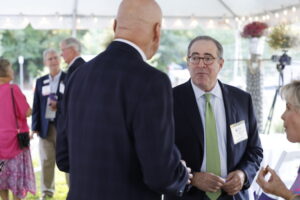
Pete Tannenbaum (JD ’87) at Alliance Medical Ministry’s 20th anniversary celebration in 2023. Photos courtesy of Alliance Medical Ministry
On a recent Monday morning, the atmosphere inside Alliance Medical Ministry, a Raleigh, North Carolina, free clinic that serves uninsured adults, was quiet and industrious.
In the lobby, a receptionist spoke in Spanish with a visitor. And in the halls of the former Baptist church, executive director Pete Tannenbaum (JD ’87) checked in with some of the staff — a patient assistance coordinator who secures $503,000 a month in free prescription medications for Alliance’s patients, and the farm and wellness coordinator who tends the on-site garden that annually produces 2,200 pounds of fresh produce to distribute.
Leading a health-care nonprofit might not seem like a logical career step for Tannenbaum, who spent most of his career as an investment banker. But all along, he was giving back, serving on boards in Raleigh and following the example of his aunt — the late Leah Tannenbaum, a noted Greensboro, North Carolina, philanthropist who spent her life supporting children’s and social justice issues and the arts.
“For my whole family, she set an example for giving back to the community and not just writing a check, but rolling up your sleeves and doing it,” Tannenbaum says. Alliance Medical Ministry was “the right place at the right time for me, and it combined the medical side, the philanthropic side and helping our neighbors in what is one of our community’s biggest problems. It’s heartbreaking, the stories of the people that come here.”
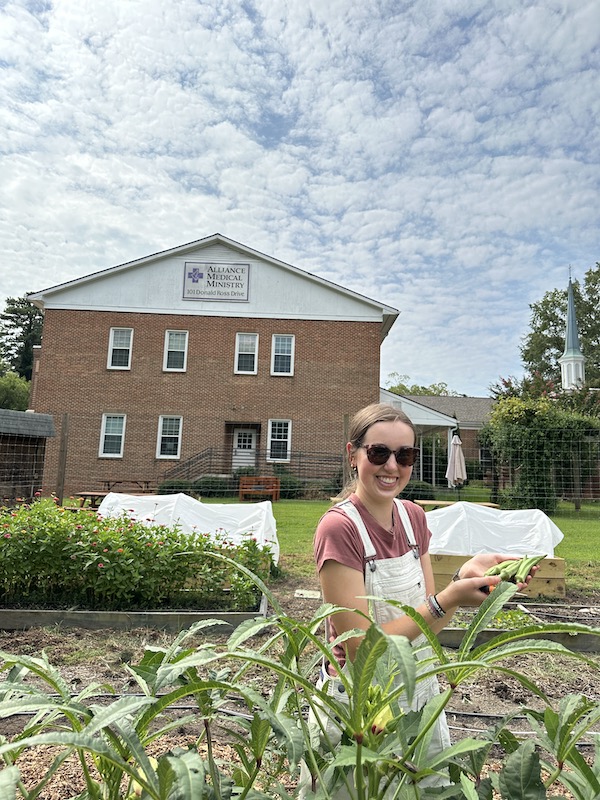
Alliance Medical Ministry's on-site garden
Holistic Approach
Even with North Carolina’s expanded Medicaid coverage to more adults last year, about 70,000 individuals in Wake County still fall in the health-care gap, unable to qualify for Medicare or Medicaid or afford private health insurance. They seek care in local emergency rooms and hospitals instead, racking up costly medical bills, Tannenbaum says. An average ER visit in North Carolina costs $4,500 while an average AMM patient pays just $20 per visit.
“They’re in survival mode, and they’re juggling multiple life crises while trying to maintain their health,” Tannenbaum says. “Medical costs are the leading cause of bankruptcy in our country, and our patients are poor.”
Alliance’s patients without transportation travel two hours by bus or take a taxi or Uber to get to the clinic, which sits just southeast of downtown Raleigh. Most patients are struggling with two or more chronic diseases. On top of complex medical issues, patients need help with other challenges in their day-to-day lives, Tannenbaum says. They’re dealing with trauma and interpersonal violence — and struggling to find adequate housing and food.
That’s why the nonprofit provides more than primary care and disease management. Alliance also connects patients with nutritionists, mental health counselors, social workers, diabetes educators and other professionals to treat mind, body and spirit. All of them work on site.
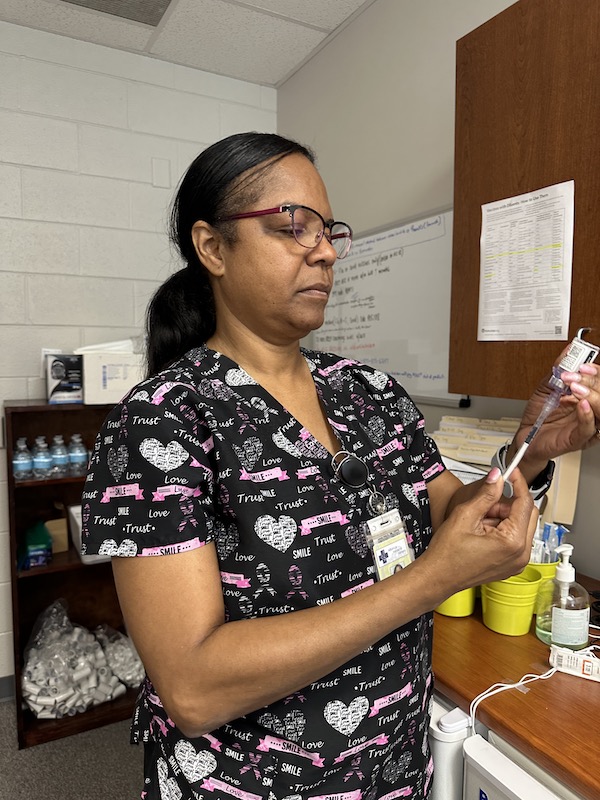
A nurse preparing an immunization
While providers at a typical health care facility might see 20 to 25 patients a day, Alliance’s doctors see eight to 10 to ensure the patients’ needs are met, Tannenbaum says. “They take time. Their incentive is purely the health of the patient, not to get to the next patient.”
Leading, Serving
After earning an undergraduate degree from Duke University in 1984, Tannenbaum headed to Wake Forest’s law school, where he eventually realized he didn’t want to practice law. That realization was partly what intrigued Nancy Pickel Tannenbaum (’87) about him after the two met at a mixer when she was a senior and he was a third-year law student.
“He was a little bit older and just kind of had a certain maturity about him,” she remembers. “I kind of loved that he was in law school, and he knew he didn’t want to be a lawyer. I just liked how he was thinking outside of the box already at that age.”
The two married. (Pickel Tannenbaum does marketing for a law firm.) Tannenbaum eventually became a partner in an investment bank, Trident Financial Corp. And, after 20 years of flying multiple times a week throughout the country for meetings, he grew tired of it. When the bank sold in 2005, he decided to take a step back to spend more time at home with his family, including two daughters who are now young adults.
“The people I work with, I would never want to let them down.”
He did some consulting and stepped up his work in the Raleigh community, focusing on organizations of importance to his family. He served on the boards of Marbles Kids Museum and Ravenscroft School, which his daughters attended.
During his tenure at Ravenscroft, Tannenbaum helped craft the school’s Lead From Here educational framework, which imbues lessons of collaboration, critical thinking and accountability across its curriculum to ensure students leave with the skills required for the workforce.
“Pete helped us think about it as not being a circle or a community that’s facing inward, but really, that’s facing outward,” says Doreen Kelly, Ravenscroft’s head of school. “And you can see that in his career and in his life. He’s always been drawn to work that is impact work.”
‘Stars Just Aligned’
By 2018, his daughters were older, and Tannenbaum was ready for something new when he was recruited to lead Alliance Medical Ministry. “The stars just aligned,” he says.
It’s not been an easy six years to work in health care. His legal education at Wake Forest — where he learned the importance of being ready for whatever his professors, particularly Professor Emeritus George Walker in his civil procedures class, threw his way — has helped. “Being prepared motivates me and haunts me to this day,” he jokes.
That ability to pivot and respond became critical during the pandemic. The clinic moved to provide telehealth services more quickly than most. And Tannenbaum helped lead a massive effort to provide COVID-19 vaccinations to the community.
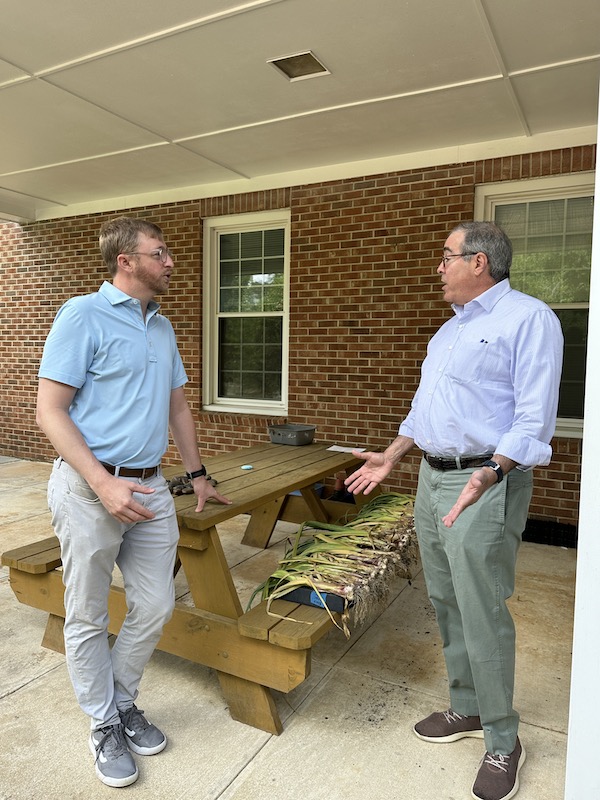
On left, Alliance board member Jared Brown, with Tannenbaum
Under his leadership, the nonprofit has developed partnerships with local specialty clinics to provide its patients with more specific care. And it’s one of the first free and charitable clinics in the country to give its patients opportunities to participate in clinical research through a collaboration with SiteBridge Research, which connects doctors and patients to clinical trials.
Women and people of color are “substantially underrepresented in clinical trials,” according to The New England Journal of Medicine, which can impact research results and patients’ confidence in new treatments. “We’re cutting edge in terms of being a free clinic,” Tannenbaum says.
Sig Hutchinson, a former Wake County commissioner, remembers working with Tannenbaum in 2021 as local hospitals implemented an electronic medical record system, which helps patients track their health information. Hutchinson invited local nonprofits to learn more about it, and Tannenbaum got engaged in the conversation where others did not, he says.
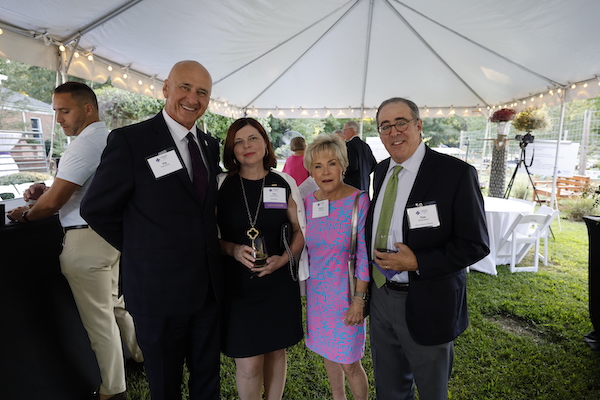
From left, Sig Hutchinson, Vita Schumacher, Nancy Hutchinson and Pete Tannenbaum during Alliance Medical Ministry’s 20th anniversary celebration in 2023
Ultimately, the county provided a $100,000 grant to cover the upfront costs of implementing the records system at Alliance. Hutchinson credits the success to Tannenbaum’s leadership. “Pete Tannenbaum is the epitome of a servant leader, and truly unique in the nonprofit world in his ability to be effective, to communicate and to collaborate,” Hutchinson says.
As Tannenbaum looks to the future, there’s plenty of work to do and money to raise. Most of Alliance’s income comes from fundraising and grants. Tannenbaum is focused on building support for the nonprofit and finding new ways to expand health-care access to those in need.
“The people I work with, I would never want to let them down,” he says. “They are such good people, and they’re here for the right reasons. I view myself as the leader who has to make it happen. When we lose a grant, and we lost one last week, we feel it. And it motivates us to work harder to reach out to more people to tell our story.”
Sarah Lindenfeld Hall is a longtime North Carolina-based journalist, former staff writer for the Winston-Salem Journal and The (Raleigh) News & Observer and founding editor of WRAL-TV’s popular parenting website. Today, she’s a freelance writer, regularly diving into stories about interesting people and parenting, health, education, business and technology topics.


